Unit 6 In the kitchen 重难点精讲精练 (含答案)
文档属性
| 名称 | Unit 6 In the kitchen 重难点精讲精练 (含答案) |
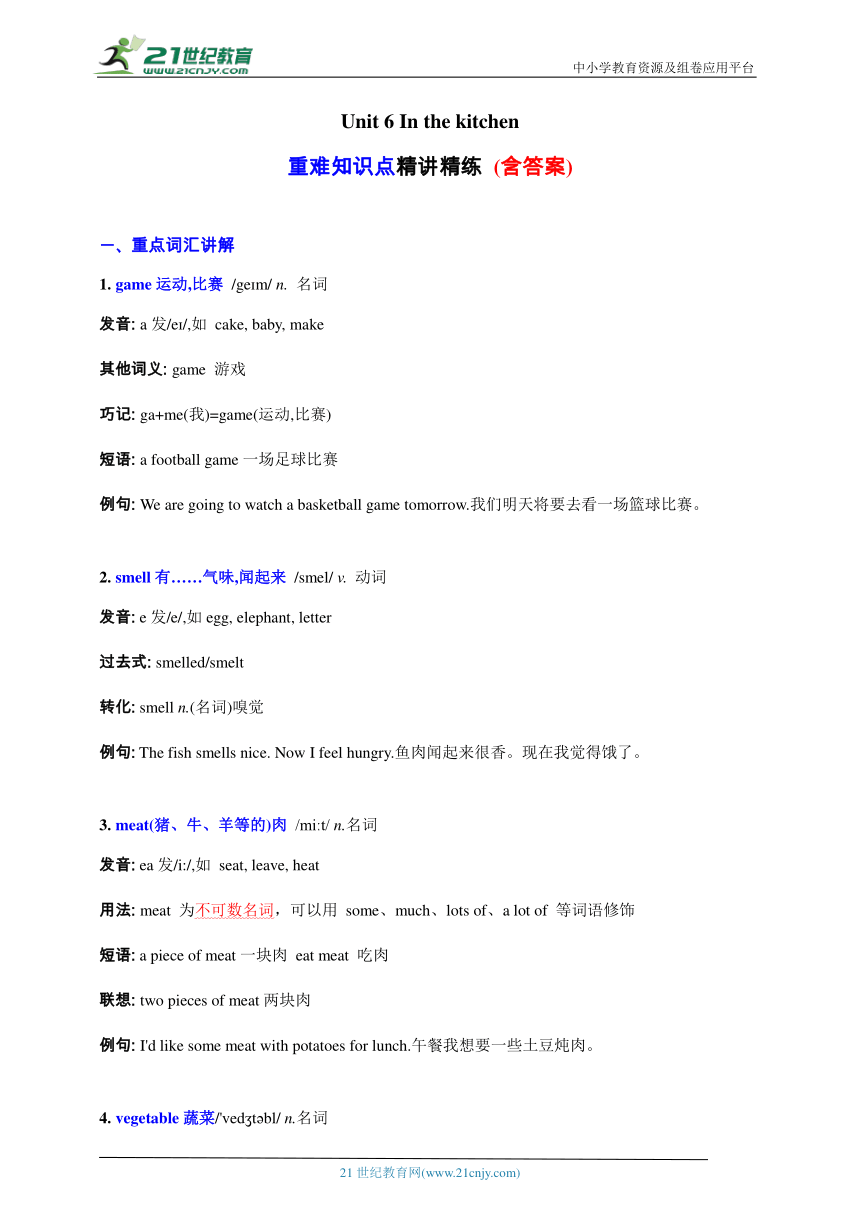
|
|
| 格式 | docx | ||
| 文件大小 | 310.0KB | ||
| 资源类型 | 试卷 | ||
| 版本资源 | 牛津译林版 | ||
| 科目 | 英语 | ||
| 更新时间 | 2024-05-16 18:47:48 | ||
图片预览

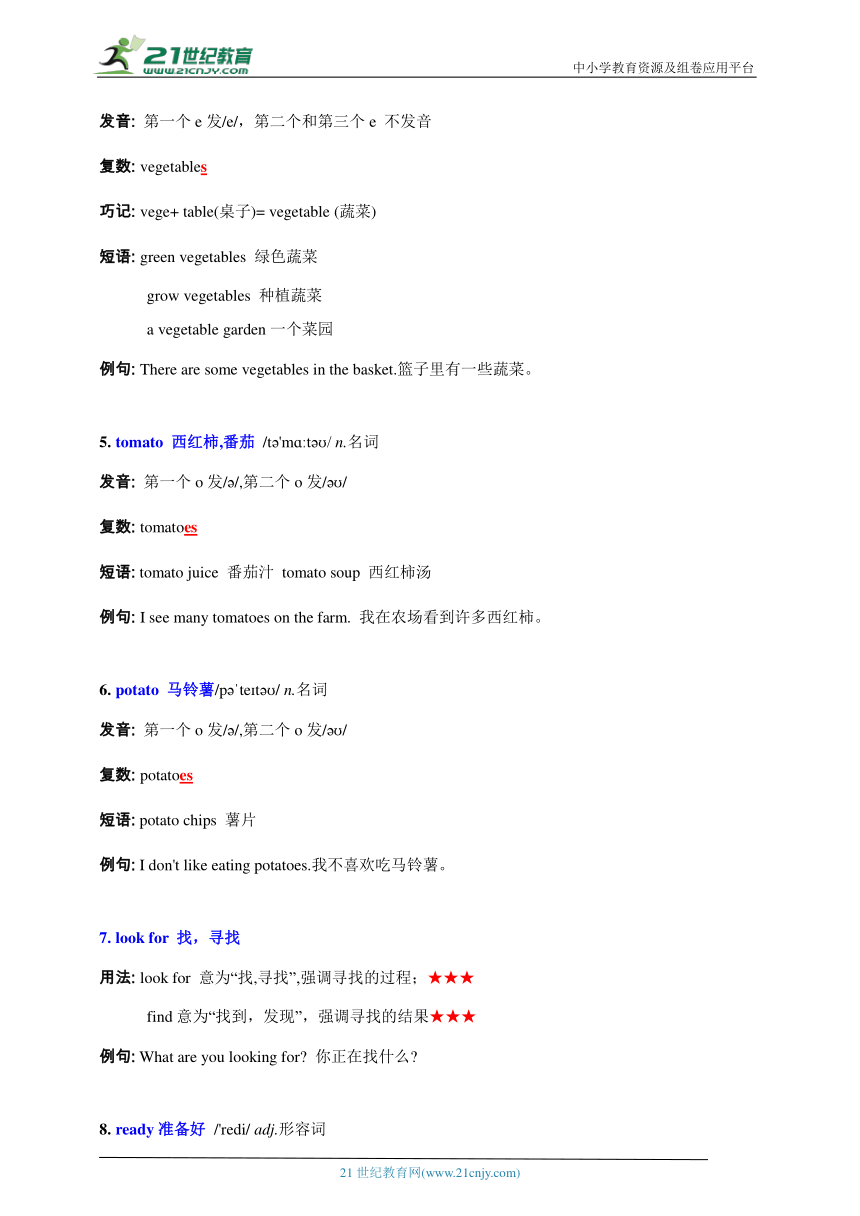
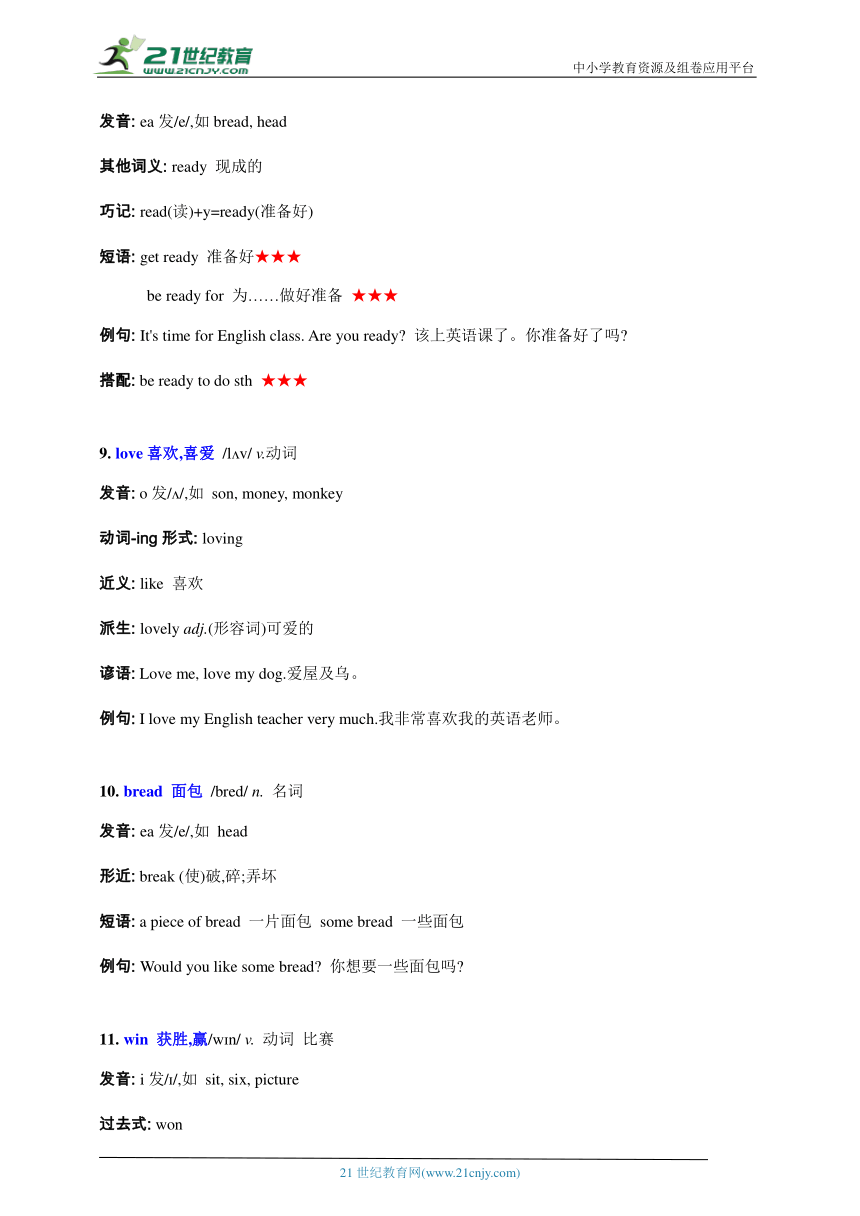
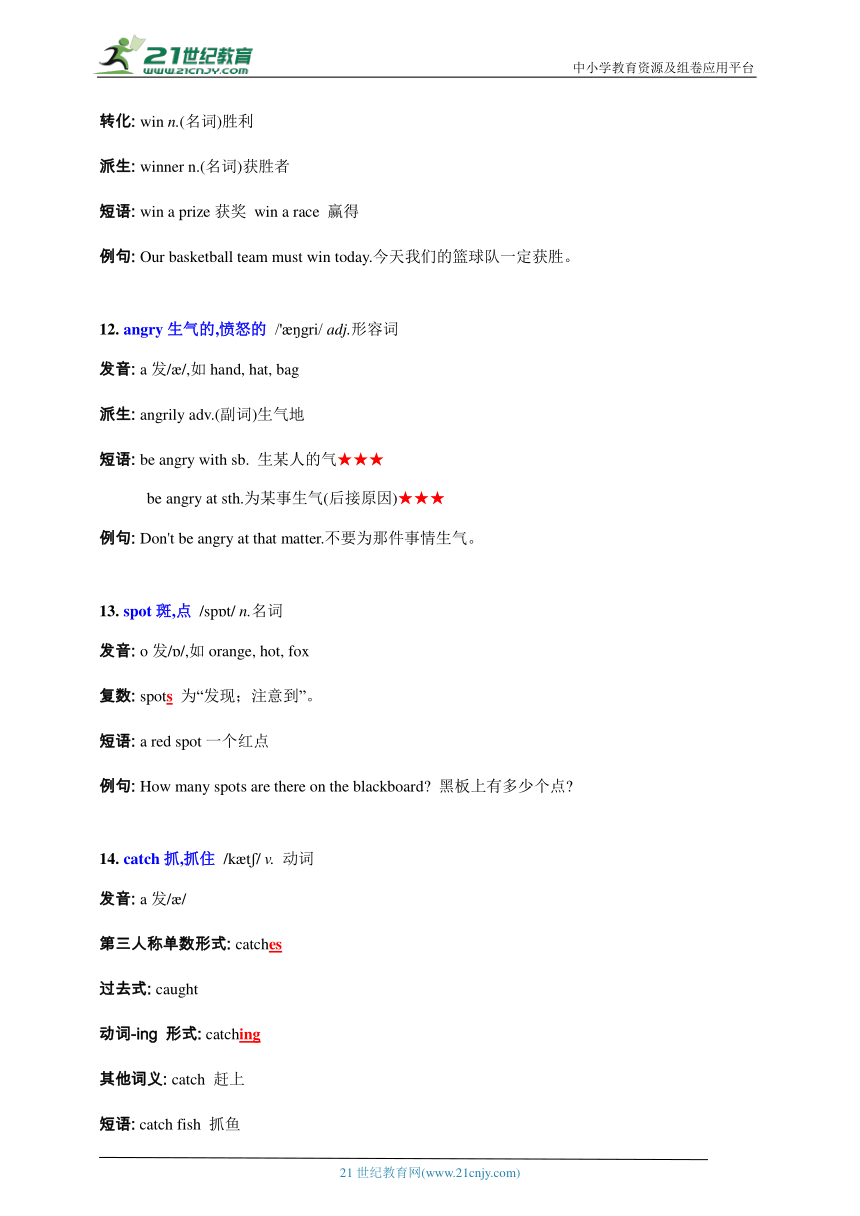
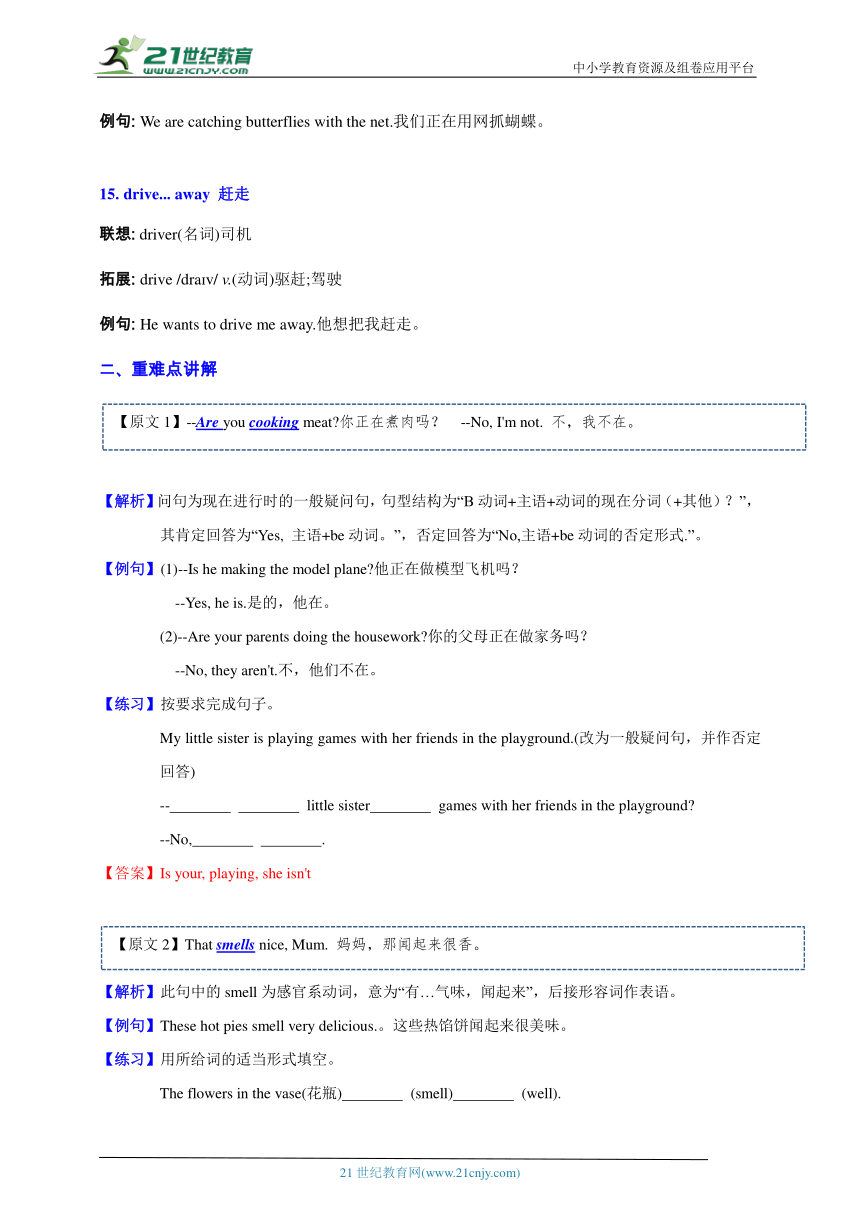
文档简介
中小学教育资源及组卷应用平台
Unit 6 In the kitchen
重难知识点精讲精练 (含答案)
重点词汇讲解
game运动,比赛 /ge m/ n. 名词
发音: a发/e /,如 cake, baby, make
其他词义: game 游戏
巧记: ga+me(我)=game(运动,比赛)
短语: a football game一场足球比赛
例句: We are going to watch a basketball game tomorrow.我们明天将要去看一场篮球比赛。
smell有……气味,闻起来 /smel/ v. 动词
发音: e发/e/,如egg, elephant, letter
过去式: smelled/smelt
转化: smell n.(名词)嗅觉
例句: The fish smells nice. Now I feel hungry.鱼肉闻起来很香。现在我觉得饿了。
meat(猪、牛、羊等的)肉 /mi t/ n.名词
发音: ea发/i:/,如 seat, leave, heat
用法: meat 为不可数名词,可以用 some、much、lots of、a lot of 等词语修饰
短语: a piece of meat一块肉 eat meat 吃肉
联想: two pieces of meat两块肉
例句: I'd like some meat with potatoes for lunch.午餐我想要一些土豆炖肉。
vegetable蔬菜/'ved t bl/ n.名词
发音: 第一个e发/e/,第二个和第三个e 不发音
复数: vegetables
巧记: vege+ table(桌子)= vegetable (蔬菜)
短语: green vegetables 绿色蔬菜
grow vegetables 种植蔬菜
a vegetable garden一个菜园
例句: There are some vegetables in the basket.篮子里有一些蔬菜。
tomato 西红柿,番茄 /t 'mɑ t / n.名词
发音: 第一个o发/ /,第二个o发/ /
复数: tomatoes
短语: tomato juice 番茄汁 tomato soup 西红柿汤
例句: I see many tomatoes on the farm. 我在农场看到许多西红柿。
potato 马铃薯/p te t / n.名词
发音: 第一个o发/ /,第二个o发/ /
复数: potatoes
短语: potato chips 薯片
例句: I don't like eating potatoes.我不喜欢吃马铃薯。
look for 找,寻找
用法: look for 意为“找,寻找”,强调寻找的过程;★★★
find意为“找到,发现”,强调寻找的结果★★★
例句: What are you looking for 你正在找什么
ready准备好 /'redi/ adj.形容词
发音: ea发/e/,如bread, head
其他词义: ready 现成的
巧记: read(读)+y=ready(准备好)
短语: get ready 准备好★★★
be ready for 为……做好准备 ★★★
例句: It's time for English class. Are you ready 该上英语课了。你准备好了吗
搭配: be ready to do sth ★★★
love喜欢,喜爱 /l v/ v.动词
发音: o发/ /,如 son, money, monkey
动词-ing形式: loving
近义: like 喜欢
派生: lovely adj.(形容词)可爱的
谚语: Love me, love my dog.爱屋及乌。
例句: I love my English teacher very much.我非常喜欢我的英语老师。
bread 面包 /bred/ n. 名词
发音: ea发/e/,如 head
形近: break (使)破,碎;弄坏
短语: a piece of bread 一片面包 some bread 一些面包
例句: Would you like some bread 你想要一些面包吗
win 获胜,赢/w n/ v. 动词 比赛
发音: i发/ /,如 sit, six, picture
过去式: won
转化: win n.(名词)胜利
派生: winner n.(名词)获胜者
短语: win a prize获奖 win a race 赢得
例句: Our basketball team must win today.今天我们的篮球队一定获胜。
angry生气的,愤怒的 /' gri/ adj.形容词
发音: a发/ /,如hand, hat, bag
派生: angrily adv.(副词)生气地
短语: be angry with sb. 生某人的气★★★
be angry at sth.为某事生气(后接原因)★★★
例句: Don't be angry at that matter.不要为那件事情生气。
spot斑,点 /sp t/ n.名词
发音: o发/ /,如orange, hot, fox
复数: spots 为“发现;注意到”。
短语: a red spot一个红点
例句: How many spots are there on the blackboard 黑板上有多少个点
catch抓,抓住 /k t / v. 动词
发音: a发/ /
第三人称单数形式: catches
过去式: caught
动词-ing 形式: catching
其他词义: catch 赶上
短语: catch fish 抓鱼
例句: We are catching butterflies with the net.我们正在用网抓蝴蝶。
drive... away 赶走
联想: driver(名词)司机
拓展: drive /dra v/ v.(动词)驱赶;驾驶
例句: He wants to drive me away.他想把我赶走。
重难点讲解
【解析】问句为现在进行时的一般疑问句,句型结构为“B动词+主语+动词的现在分词(+其他)?”,其肯定回答为“Yes, 主语+be动词。”,否定回答为“No,主语+be动词的否定形式.”。
【例句】(1)--Is he making the model plane 他正在做模型飞机吗?
--Yes, he is.是的,他在。
(2)--Are your parents doing the housework 你的父母正在做家务吗?
--No, they aren't.不,他们不在。
【练习】按要求完成句子。
My little sister is playing games with her friends in the playground.(改为一般疑问句,并作否定回答)
-- little sister games with her friends in the playground
--No, .
【答案】Is your, playing, she isn't
【解析】此句中的smell为感官系动词,意为“有…气味,闻起来”,后接形容词作表语。
【例句】These hot pies smell very delicious.。这些热馅饼闻起来很美味。
【练习】用所给词的适当形式填空。
The flowers in the vase(花瓶) (smell) (well).
【答案】smell, good
【解析】此句中的介词with译为“具有;带有”。
potato为可数名词,意为“马铃薯,土豆”,其复数形式是在词尾加es。
【拓展】(1)with也可以译为“与一起”,还可以译为“用;使用;以;借”。
(2)以o结尾的可数名词复数形式的变化规则:
①有生命的名词,直接在词尾加es,例如:hero--heroes,tomato--tomatoes
②无生命的名词,直接在词尾加s,例如:photo--photos,radio--radios
③以oo结尾的名词,只在词尾加s,例如:zoo--zoos,kangaroo--kangaroos。
④注意,mango由单数改为复数,既可以在词尾加es,也可以在词尾加s,即mango--mangoes/mangos。
【例句】(1) Yang Ling can cook chicken with mushrooms..杨玲会做蘑菇烧鸡。
(2)She's a tall girl with long hair.她是一个有着长头发的高个子女孩。
(3)I'm eating noodles with chopsticks..我正在用筷子吃面条。
【练习】根据中文提示完成句子或对话。
我的叔叔和我的祖父母一起住在上海。
My uncle Shanghai my grandparents.
--你的妈妈会做西红柿炒鸡蛋吗? --当然。
--Can your mother eggs --Sure.
【答案】(1)lives in,with (2)cook tomatoes with
【解析】can’t wait意为“等不及,迫不及待”,可以单独使用,也可以后接动词不定式,即can't wait to do sth,意为“等不及/迫不及待做某事”。“I can’t wait!”常用于口语中,表示说话者着急做某事。
【例句】I can't wait to go to the amusement park. 我等不及要去游乐园了。
【练习】情景选择。
( )妈妈让你猜猜生日礼物是什么,可你很着急想拿到礼物,你会说:
A.I can't wait! B.Let me try. C.Hurry up!
【答案】A
【解析】此句为there be句型的一般现在时的一般疑问句
句型结构为“Be动词+there+主语+地点?”,用来询问某地是否存在某人或某物。在将there be句型的肯定句改为一般疑问句时,只需将be动词提至句首,句末句号改为问号即可。其肯定回答为“Yes,there is/are.”,否定回答为“No, there isn't/aren't.”。注意,如果肯定句中有some,在改为一般疑问句时要将some改为any。
【例句】(1)--Is there any bread in the lunch box 午餐盒里有面包吗?
--No, there isn't. 不,没有。
(2)--Are there any basketballs in the gym 体育馆里有篮球吗?
--Yes, there are. 是的,有。
【练习】用所给词的适当形式填空。
-- there any milk and cakes for breakfast,Mum
--No. But there some noodles. (be)
【答案】Is, are
【解析】句型“How many+可数名词复数+do/does+主语+have ”用来询问某人或某物拥有某物品的数量,其答句为“主语+have/has+数词+可数名词单数/复数”,此时名词可以省略,直接用数词回答。
【例句】(1)--How many pencils do you have 你有多少支铅笔?
--I have three(pencils).我有三支(铅笔)。
(2)--How many legs does the rabbit have 这只免子有多少条腿?
--It has four(legs).它有四条(腿)。
【练习】按要求完成句子。
Yang Ling has one new white dress.(对画线部分提问)
new white Yang Ling
【答案】How many, dresses does, have
【解析】drive...away意为“赶走”,其宾语可以是名词,也可以是代词的宾格形式。当其宾语为名词时,名词既可以放在drive和away的中间,也可以放在drive away的后面;当其宾语为代词的宾格形式时,代词的宾格形式只能放在drive和away的中间。
【例句】(l) Please drive the dog away. = Please drive away the dog. 请把这只狗赶走。
(2) I'm afraid of bees. Can you help me drive them away
我害怕蜜蜂。你可以帮我赶走它们吗?
【练习】(1)单项选择。
( )Please the birds. They're eating the cherries.
A.get off B.take off C.drive away
(2)按要求完成句子。
The monkey is very naughty. I drive away the monkey.(两句合并为一句)
I the monkey .
【答案】(1)C (2)drive, naughty, away
第二部分:易错易混全解
there be句型中be动词的用法不清
【例题】从方框中选择合适的单词填空。
is are
(1)There a little juice in the glass.
(2)There some teachers in the school hall.
(3)There an art room and two music rooms on the second floor.
【答案】(1)is (2)are (3)is
点拨:在there be句型的一般现在时的肯定句中,当主语为可数名词单数或不可数名词时,be动词用is;当主语为可数名词复数时,be动词用are;当主语为由and连接的两个或两个以上的名词时,be动词要遵循“就近原则”,即be动词要根据离其最近的那个名词的单复数决定用is还是are。题(1),设空处后为由a little修饰的不可数名词juice,故填is。题(2),设空处后为由some修饰的可数名词复数teachers,故填are。题(3),设空处后为由and连接的两个并列名词短语,但离设空处最近的an art room表示的是单数意义,故填is。
易混淆look for与find的用法
【例题】单项选择。
( )I’m my English book everywhere, but I can't it.
A.finding;find B.find;look for C.looking for;find
【答案】C
点拨:
look for和find都有“找”的意思,两者的区别在于,look for意为“找,寻找”,强调寻找的过程;find意为“找到”,强调寻找的结果。本题前半句强调寻找英语书的过程,后半句强调没有找到这个结果,故选C。
21世纪教育网 www.21cnjy.com 精品试卷·第 2 页 (共 2 页)
21世纪教育网(www.21cnjy.com)
Unit 6 In the kitchen
重难知识点精讲精练 (含答案)
重点词汇讲解
game运动,比赛 /ge m/ n. 名词
发音: a发/e /,如 cake, baby, make
其他词义: game 游戏
巧记: ga+me(我)=game(运动,比赛)
短语: a football game一场足球比赛
例句: We are going to watch a basketball game tomorrow.我们明天将要去看一场篮球比赛。
smell有……气味,闻起来 /smel/ v. 动词
发音: e发/e/,如egg, elephant, letter
过去式: smelled/smelt
转化: smell n.(名词)嗅觉
例句: The fish smells nice. Now I feel hungry.鱼肉闻起来很香。现在我觉得饿了。
meat(猪、牛、羊等的)肉 /mi t/ n.名词
发音: ea发/i:/,如 seat, leave, heat
用法: meat 为不可数名词,可以用 some、much、lots of、a lot of 等词语修饰
短语: a piece of meat一块肉 eat meat 吃肉
联想: two pieces of meat两块肉
例句: I'd like some meat with potatoes for lunch.午餐我想要一些土豆炖肉。
vegetable蔬菜/'ved t bl/ n.名词
发音: 第一个e发/e/,第二个和第三个e 不发音
复数: vegetables
巧记: vege+ table(桌子)= vegetable (蔬菜)
短语: green vegetables 绿色蔬菜
grow vegetables 种植蔬菜
a vegetable garden一个菜园
例句: There are some vegetables in the basket.篮子里有一些蔬菜。
tomato 西红柿,番茄 /t 'mɑ t / n.名词
发音: 第一个o发/ /,第二个o发/ /
复数: tomatoes
短语: tomato juice 番茄汁 tomato soup 西红柿汤
例句: I see many tomatoes on the farm. 我在农场看到许多西红柿。
potato 马铃薯/p te t / n.名词
发音: 第一个o发/ /,第二个o发/ /
复数: potatoes
短语: potato chips 薯片
例句: I don't like eating potatoes.我不喜欢吃马铃薯。
look for 找,寻找
用法: look for 意为“找,寻找”,强调寻找的过程;★★★
find意为“找到,发现”,强调寻找的结果★★★
例句: What are you looking for 你正在找什么
ready准备好 /'redi/ adj.形容词
发音: ea发/e/,如bread, head
其他词义: ready 现成的
巧记: read(读)+y=ready(准备好)
短语: get ready 准备好★★★
be ready for 为……做好准备 ★★★
例句: It's time for English class. Are you ready 该上英语课了。你准备好了吗
搭配: be ready to do sth ★★★
love喜欢,喜爱 /l v/ v.动词
发音: o发/ /,如 son, money, monkey
动词-ing形式: loving
近义: like 喜欢
派生: lovely adj.(形容词)可爱的
谚语: Love me, love my dog.爱屋及乌。
例句: I love my English teacher very much.我非常喜欢我的英语老师。
bread 面包 /bred/ n. 名词
发音: ea发/e/,如 head
形近: break (使)破,碎;弄坏
短语: a piece of bread 一片面包 some bread 一些面包
例句: Would you like some bread 你想要一些面包吗
win 获胜,赢/w n/ v. 动词 比赛
发音: i发/ /,如 sit, six, picture
过去式: won
转化: win n.(名词)胜利
派生: winner n.(名词)获胜者
短语: win a prize获奖 win a race 赢得
例句: Our basketball team must win today.今天我们的篮球队一定获胜。
angry生气的,愤怒的 /' gri/ adj.形容词
发音: a发/ /,如hand, hat, bag
派生: angrily adv.(副词)生气地
短语: be angry with sb. 生某人的气★★★
be angry at sth.为某事生气(后接原因)★★★
例句: Don't be angry at that matter.不要为那件事情生气。
spot斑,点 /sp t/ n.名词
发音: o发/ /,如orange, hot, fox
复数: spots 为“发现;注意到”。
短语: a red spot一个红点
例句: How many spots are there on the blackboard 黑板上有多少个点
catch抓,抓住 /k t / v. 动词
发音: a发/ /
第三人称单数形式: catches
过去式: caught
动词-ing 形式: catching
其他词义: catch 赶上
短语: catch fish 抓鱼
例句: We are catching butterflies with the net.我们正在用网抓蝴蝶。
drive... away 赶走
联想: driver(名词)司机
拓展: drive /dra v/ v.(动词)驱赶;驾驶
例句: He wants to drive me away.他想把我赶走。
重难点讲解
【解析】问句为现在进行时的一般疑问句,句型结构为“B动词+主语+动词的现在分词(+其他)?”,其肯定回答为“Yes, 主语+be动词。”,否定回答为“No,主语+be动词的否定形式.”。
【例句】(1)--Is he making the model plane 他正在做模型飞机吗?
--Yes, he is.是的,他在。
(2)--Are your parents doing the housework 你的父母正在做家务吗?
--No, they aren't.不,他们不在。
【练习】按要求完成句子。
My little sister is playing games with her friends in the playground.(改为一般疑问句,并作否定回答)
-- little sister games with her friends in the playground
--No, .
【答案】Is your, playing, she isn't
【解析】此句中的smell为感官系动词,意为“有…气味,闻起来”,后接形容词作表语。
【例句】These hot pies smell very delicious.。这些热馅饼闻起来很美味。
【练习】用所给词的适当形式填空。
The flowers in the vase(花瓶) (smell) (well).
【答案】smell, good
【解析】此句中的介词with译为“具有;带有”。
potato为可数名词,意为“马铃薯,土豆”,其复数形式是在词尾加es。
【拓展】(1)with也可以译为“与一起”,还可以译为“用;使用;以;借”。
(2)以o结尾的可数名词复数形式的变化规则:
①有生命的名词,直接在词尾加es,例如:hero--heroes,tomato--tomatoes
②无生命的名词,直接在词尾加s,例如:photo--photos,radio--radios
③以oo结尾的名词,只在词尾加s,例如:zoo--zoos,kangaroo--kangaroos。
④注意,mango由单数改为复数,既可以在词尾加es,也可以在词尾加s,即mango--mangoes/mangos。
【例句】(1) Yang Ling can cook chicken with mushrooms..杨玲会做蘑菇烧鸡。
(2)She's a tall girl with long hair.她是一个有着长头发的高个子女孩。
(3)I'm eating noodles with chopsticks..我正在用筷子吃面条。
【练习】根据中文提示完成句子或对话。
我的叔叔和我的祖父母一起住在上海。
My uncle Shanghai my grandparents.
--你的妈妈会做西红柿炒鸡蛋吗? --当然。
--Can your mother eggs --Sure.
【答案】(1)lives in,with (2)cook tomatoes with
【解析】can’t wait意为“等不及,迫不及待”,可以单独使用,也可以后接动词不定式,即can't wait to do sth,意为“等不及/迫不及待做某事”。“I can’t wait!”常用于口语中,表示说话者着急做某事。
【例句】I can't wait to go to the amusement park. 我等不及要去游乐园了。
【练习】情景选择。
( )妈妈让你猜猜生日礼物是什么,可你很着急想拿到礼物,你会说:
A.I can't wait! B.Let me try. C.Hurry up!
【答案】A
【解析】此句为there be句型的一般现在时的一般疑问句
句型结构为“Be动词+there+主语+地点?”,用来询问某地是否存在某人或某物。在将there be句型的肯定句改为一般疑问句时,只需将be动词提至句首,句末句号改为问号即可。其肯定回答为“Yes,there is/are.”,否定回答为“No, there isn't/aren't.”。注意,如果肯定句中有some,在改为一般疑问句时要将some改为any。
【例句】(1)--Is there any bread in the lunch box 午餐盒里有面包吗?
--No, there isn't. 不,没有。
(2)--Are there any basketballs in the gym 体育馆里有篮球吗?
--Yes, there are. 是的,有。
【练习】用所给词的适当形式填空。
-- there any milk and cakes for breakfast,Mum
--No. But there some noodles. (be)
【答案】Is, are
【解析】句型“How many+可数名词复数+do/does+主语+have ”用来询问某人或某物拥有某物品的数量,其答句为“主语+have/has+数词+可数名词单数/复数”,此时名词可以省略,直接用数词回答。
【例句】(1)--How many pencils do you have 你有多少支铅笔?
--I have three(pencils).我有三支(铅笔)。
(2)--How many legs does the rabbit have 这只免子有多少条腿?
--It has four(legs).它有四条(腿)。
【练习】按要求完成句子。
Yang Ling has one new white dress.(对画线部分提问)
new white Yang Ling
【答案】How many, dresses does, have
【解析】drive...away意为“赶走”,其宾语可以是名词,也可以是代词的宾格形式。当其宾语为名词时,名词既可以放在drive和away的中间,也可以放在drive away的后面;当其宾语为代词的宾格形式时,代词的宾格形式只能放在drive和away的中间。
【例句】(l) Please drive the dog away. = Please drive away the dog. 请把这只狗赶走。
(2) I'm afraid of bees. Can you help me drive them away
我害怕蜜蜂。你可以帮我赶走它们吗?
【练习】(1)单项选择。
( )Please the birds. They're eating the cherries.
A.get off B.take off C.drive away
(2)按要求完成句子。
The monkey is very naughty. I drive away the monkey.(两句合并为一句)
I the monkey .
【答案】(1)C (2)drive, naughty, away
第二部分:易错易混全解
there be句型中be动词的用法不清
【例题】从方框中选择合适的单词填空。
is are
(1)There a little juice in the glass.
(2)There some teachers in the school hall.
(3)There an art room and two music rooms on the second floor.
【答案】(1)is (2)are (3)is
点拨:在there be句型的一般现在时的肯定句中,当主语为可数名词单数或不可数名词时,be动词用is;当主语为可数名词复数时,be动词用are;当主语为由and连接的两个或两个以上的名词时,be动词要遵循“就近原则”,即be动词要根据离其最近的那个名词的单复数决定用is还是are。题(1),设空处后为由a little修饰的不可数名词juice,故填is。题(2),设空处后为由some修饰的可数名词复数teachers,故填are。题(3),设空处后为由and连接的两个并列名词短语,但离设空处最近的an art room表示的是单数意义,故填is。
易混淆look for与find的用法
【例题】单项选择。
( )I’m my English book everywhere, but I can't it.
A.finding;find B.find;look for C.looking for;find
【答案】C
点拨:
look for和find都有“找”的意思,两者的区别在于,look for意为“找,寻找”,强调寻找的过程;find意为“找到”,强调寻找的结果。本题前半句强调寻找英语书的过程,后半句强调没有找到这个结果,故选C。
21世纪教育网 www.21cnjy.com 精品试卷·第 2 页 (共 2 页)
21世纪教育网(www.21cnjy.com)
